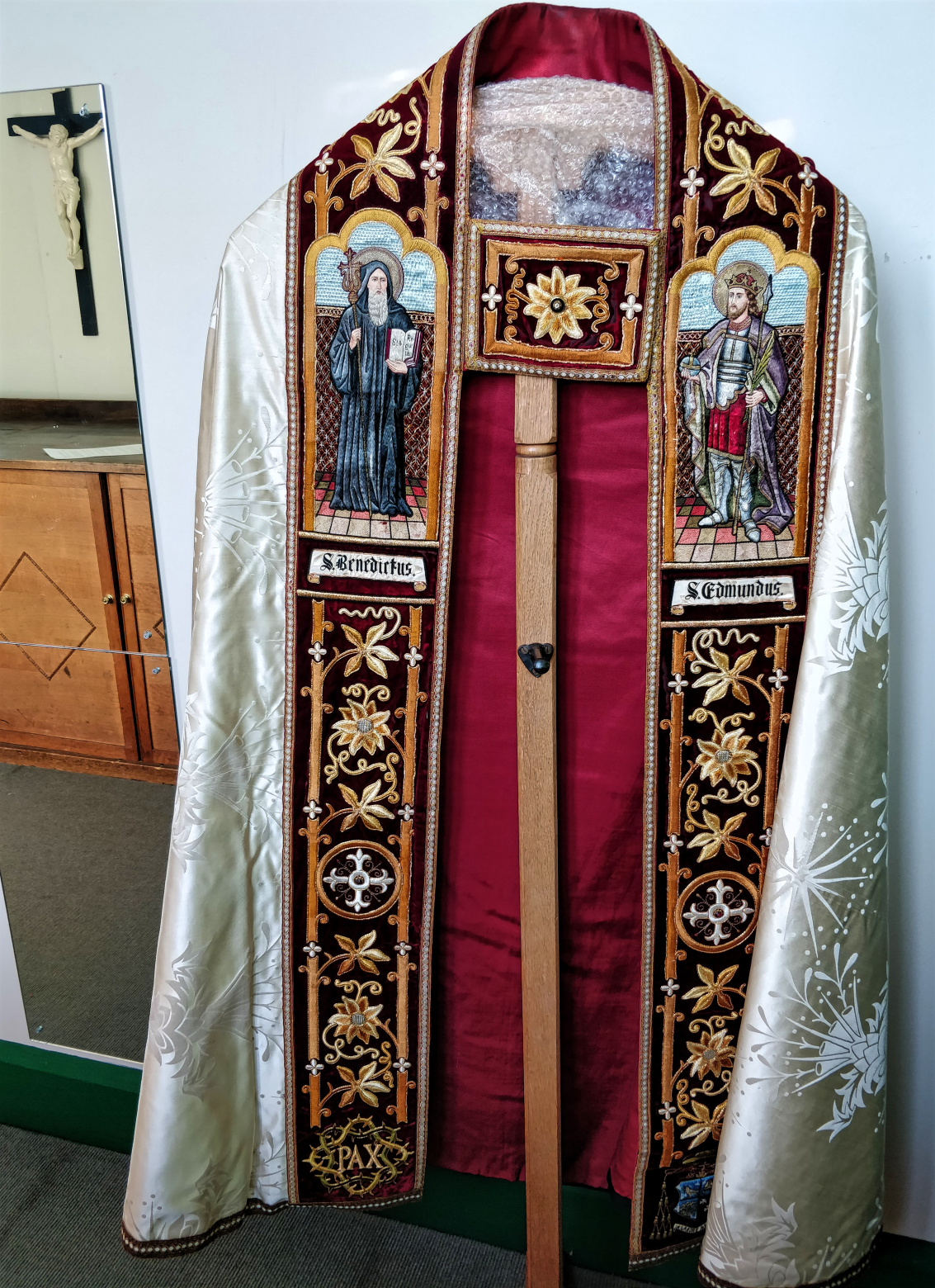For most Benedictines today is the greater of the two feast days of our founder, St Benedict. Today honours his passing to eternal life; 11 July commemorates the translation of his relics to Monte Cassino (or was it Fleury? Depends who you ask!). That we are in Lent does not dampen our celebration in any way save for the absence of the A-word.
This evening at pontifical vespers the abbot will wear our patronal, or Malvern, cope. It comes from our (Douai Abbey’s) short-lived foundation at Great Malvern, which was founded in 1891 has a ready refuge in case of our expulsion from France. When expulsion did indeed come in 1903, we settled at Woolhampton at St Mary’s College, the Portsmouth diocesan minor seminary, which the Bishop of Portsmouth kindly handed over to us. Our school and the seminary combined to form Douai School (which closed in 1999).
One of the patrons of the Malvern priory was the Douai monk and Bishop of Port Louis in Mauritius, Archbishop Benedict Scarisbrick OSB. He endowed Malvern with some lovely items for use in the opus Dei, not least this wonderful cope. The striking damask is not of English origin, possibly Belgian as our other striking vestments from that period were made by Grossé in Belgium. The embroideries, which include our patrons St Benedict and St Edmund, as well as a hood showing the Good Shepherd—represented to all Benedictines in the person of St Benedict—were probably made by the Sisters of the Poor Child Jesus in Southam in Warwickshire.
The damask showed some tears and considerable wear at the edges by 2015, and some of the decorative embroidery work, especially on the morse, had deteriorated badly. Thus, assisted by generous benefactions, we were able to approach Watts & Co of Westminster to restore the cope. Their excellent work means that the cope can again be used to honour of founder and enhance the worship of God. Some photos are below, followed by a snippet of a sermon of St Bernard of Clairvaux for this feast day.








My brethren, when I see “you coming together into one place” (I Cor 11:20) to hear the words of salvation, a violent fear comes over me lest perhaps some among you may not receive them with the due respect required by the word of God. For I am not ignorant that “the earth that drinks up the rain that falls upon it” yet which yields no fruit “is worthless and fit for a curse” (Heb 6:7,8). Of course, I would prefer only ever to bestow blessings on you, and never a curse. Even more, I earnestly pray that your Heavenly Father’s blessing—not mine, though you have it from my mouth through God’s condescension—may never be for you a curse.
Today we celebrate, dearest brethren, the birth into eternal life of our glorious master, St Benedict… For myself, I find sweet consolation in the mere thought of him though I can never utter his name without confusion. The reason is this: after his example I, like you, have renounced the world and embraced the cloister. Yet, unlike you, I share with him also the title of abbot: as Benedict was an abbot so too am I. Oh, what an abbot he was, but oh, what an abbot am I! Though our title be the same, in me it is but a shadow of a great name. Our ministry is the same, but alas how different the ministers, how different our ministrations!
Woe is me, O blessed Benedict, if I should find myself as far from thee in the next life as I am from thee in this life! But I need not dwell on this deficiency in me before you, my brethren, as I am sure you know me all too well. I do but ask that you lighten my heavy load of shame and fear with your brotherly compassion.
beautiful embroidery Father—-Happy Feast Day